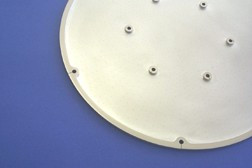
All information
© Platron 1999 - 2018

Specialists: Selective Plating
| Main Office: Platron 26260 Eden Landing Road, Hayward, California 94545 Phone: (510) 781-5588 Fax: (510) 781-5589 Email: Business Hours: Monday - Friday 7:00am - 4:00pm |
What is Selective Plating?
Simply defined, it is a special electrochemical process used to deposit any of a wide range of metals or metal alloys onto almost any conductive material and virtually any type of surface without immersing the part in a plating bath. It offers several significant advantages over conventional plating processes, the most important of which is the ability to deposit metal precisely onto the area where it is required, and in varying and closely controlled uniform thicknesses. The deposits have excellent adhesion, are dense fine grained, low in porosity and are deposited without generating any damaging heat. The Selective Plating process is portable and can be taken on site where parts can be worked on in place. The process can be used on single parts or high volume production runs.
 The outer lip and the six raised areas on this aluminum component have been Selectively Plated with Nickel. Selective Plating only plates precisely on to the areas where it is required and will not attack adjacent areas. On this component the adjacent areas have a 16 rms finish.
The outer lip and the six raised areas on this aluminum component have been Selectively Plated with Nickel. Selective Plating only plates precisely on to the areas where it is required and will not attack adjacent areas. On this component the adjacent areas have a 16 rms finish.
For more details on specific advantages of Selective Plating, click on one of the following categories:
Selective Plating only plates or anodizes the area you require
Superior adhesion
Increased wear and corrosion resistance
Accurate thickness control
Portability of Selective Plating
Military and Civilian specifications
Selective plating chemicals do not attack base metals
Selective Plating can be applied to parts big and small.
Cost saving applications of Selective Plating can be broken down into four main categories:
Design Engineering
Mechanical Applications
Field Service Applications
Electronics Applications
Theory behind conductivity:
Understanding electrical conductivity.
How electro deposition works.
Electrodeposited Gold.
Electrodeposited Silver.
Electrodeposited Nickel.